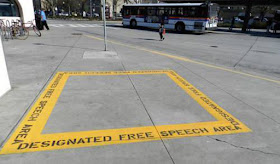is the author of American Dionysia: Violence, Tragedy, and Democratic Politics.
The Republican presidential nomination contest should be putting enormous pressure on American democracy, which is in crisis. Candidates routinely advocate with conviction positions that should not be taken seriously by any democratic society with minimal standards of reason-driven public discourse. GOP candidates claim they will deport millions of immigrants, build a segregation wall along the Mexican border, and make Mexico pay the bill; they insist that the Affordable Care Act is the worst thing to happen to the United States since slavery and must be repealed; they will deny women reproductive rights and outlaw abortion under any and all circumstances; they believe that private gun ownership could have prevented the Holocaust; they believe the proliferation of guns into every nook and cranny of American life will make the country safer; they believe that protesting police violence and holding law enforcement accountable for its crimes is tantamount to a declaration of war against cops; they will slash taxes on corporations and the rich and thereby cut deficits because of the economic growth sure to follow; in reality, this will wreck the government’s finances and put them in position to dismantle what remains of the social welfare state; they will do nothing about climate change since it either doesn’t exist or humans have nothing to do with it; either way, the American way of life as they understand it must continue unfettered; they will roll back the minimal regulations that were implemented after the great recession indifferent to the risks involved for ordinary citizens who pay the costs of their reckless speculation; they believe the United States can solve global political conflicts by exercising its prodigious military firepower, that is, through more interventions and more wars; they believe they have a greater chance of enacting this agenda if they wave the red flag of voter fraud and disenfranchise as many traditional democratic constituencies as possible through various legislative schemes designed to deny citizens access to the polls. The list could be extended.
Based on the violence and death these GOP policies and programs would unleash on tens of millions of people (or more) in the United States and around the world, it is apparent that the Republican Party harbors hatreds and resentments that have not been seen in this country since, perhaps, the Civil War when the South was determined to forge through war a second polity on the North American continent rooted in its fantasies of racial superiority. The South attacked the North in a stunning suicidal act that could only bring ruin on its political ambitions, but the rage southerners cultivated could not be contained and it ended up nearly destroying what they loved most: themselves. It is not unfair to say that the contemporary GOP is in many affective respects the heir to the Confederacy. The notorious Southern strategy launched by Richard Nixon “succeeded” beyond even his wildest dreams. The GOP of 2016 can match the ferocity, hatred, and destructive impulses characteristic of the Southern slavocracy. It is a party that seeks, among other things, the (effective) destruction of the national government, the domination and control of what it considers the lower orders, the imposition of its moral and religious values on the law of the land, and the elimination of public criticism through falsehood and intimidation.
What happens, then, if the Republicans seize control of the White House next fall? This would give them control of all three branches of the federal government through which they could unleash their pent up frustration and resentment at having had to settle for eight years of mere obstructionism under Obama. Tom Dumm’s recent posts on the rise of a degraded fascism in America touch on this issue, and I would like to approach it from a complementary angle.
Imagine it is November 8, 2016, and the Republicans have won, fairly or not, the presidential election, putting them in position to make good on their campaign rhetoric. This ascendancy follows years in which their racially-inflected pathological opposition to Barack Obama generated gratuitous untold suffering as they stifled every executive initiative they possibly could. Given the targeted violence and destruction constitutive of the Republican economic, social, political, moral, and environmental agendas, what should democratic citizens faced with the prospect of legislative and judicial onslaught do?
They could work patiently through several election cycles in anticipation of regaining control of the federal government and reversing Republican incursions. They could take to the streets to make known their displeasure and disgust at Republican depredations and hope to exert enough pressure on lawmakers to undo their self-serving designs. These are the standard moves in American politics. How long, though, can a democracy legitimately expect its citizens to pursue institutional remedies when dominant political forces use those very same institutions to enact ambitions that will deliberately inflict serious bodily and mental harm on countless people?
Republicans have become a party of radical extremists and the GOP has converted itself into an entity that defines itself by the damage it can do to other citizens, to other ways of life, to the very idea of government itself, to the possibility of a shared polity. Accomplishments are to be measured by what can be demolished, with the Affordable Care Act, Social Security, Medicare, Medicaid, unions, public education, reproductive rights, and due process in courts some of the favorite quarry. The Republican Party has no interest in democracy except as a tool to legitimize its endeavors. It has no interest in sharing a polity characterized by deep pluralism because it abhors pluralism, which makes it impossible for the party to consider the very idea of common or public things as inherently meaningful and valuable. For the GOP America names a place where like-minded individuals of wealth and influence can pursue unfettered their personal aspirations. They possess a purely instrumental mentality when it comes to politics. This is why using government to wreak havoc and destruction on commonly achieved goods, including government itself, poses no moral or political problems for them. They would, if they could, privatize everything and privatization presupposes and engenders the destruction of what is public or common.
What are democratic citizens to do when faced with an ideological-affective force like the GOP that treats politics as a life-and-death, zero-sum endeavor and fellow-citizens who resist it not as opponents, adversaries, or even the loyal opposition, but archenemies of some kind deemed unworthy of any decent regard? A politics of nonviolence, however noble and admirable, comes at great cost to those who practice it, for they are not only subjected to the violence of others, they are subjected to the violence that accompanies retrenchment, erasure, exclusion, and marginalization. This is one way in which the violence inherent in democracy manifests itself. What might the political equation look like, though, once democracy’s inherent violence can no longer be denied? What kind of signal might newly engaged democratic citizens send a newly empowered GOP on November 8, 2016? Do you have to wait for the violence to come to you to try to preempt it by whatever means democratically necessary? If the state represents not the culmination of the social contract but its principled negation, if the state represents not the people themselves but the rich and well-placed who game the political system to help their friends (themselves) and harm their enemies, what kind of response is necessary to counter a politics that is conceived of as the waging of war by other means? The state’s monopoly on violence, of course, gives it an overwhelming advantage when it comes to firepower, which means that planning any direct confrontation with its agents makes little or no sense. Yet a long-simmering anticipation of a Republican victory and its brutal consequences might lead to a spontaneous outpouring on the streets on November 8, 2016, which might prove to be the occasion for democratic citizens to remind us, as insurgent democratic citizens did on the streets of Ferguson and Baltimore in the last year, where the real power, literal and figurative, resides in democracy. If so, now seems like the time to imagine the creative possibilities of such an event.






No comments:
Post a Comment